Legal and Ethical Issues in Healthcare: Interview on Patient Relations
VerifiedAdded on 2022/10/17
|5
|1184
|26
Homework Assignment
AI Summary
This assignment is an interview with a healthcare professional, focusing on the importance of patient relationships and the ethical considerations involved in healthcare. The interview covers six key questions, including the significance of the doctor-patient relationship, methods for building rapport, the differences between face-to-face and telehealth interactions, barriers in the physician-patient relationship, strategies for building rapport with other healthcare professionals, and the importance of these professional relationships. The assignment provides detailed answers to each question, referencing relevant literature to support the interview responses. The interviewee emphasizes the importance of trust, empathy, communication, and collaboration in providing quality patient care and maintaining a positive work environment. The interview highlights the ethical dimensions of healthcare and the impact of these relationships on patient outcomes and overall healthcare service quality.
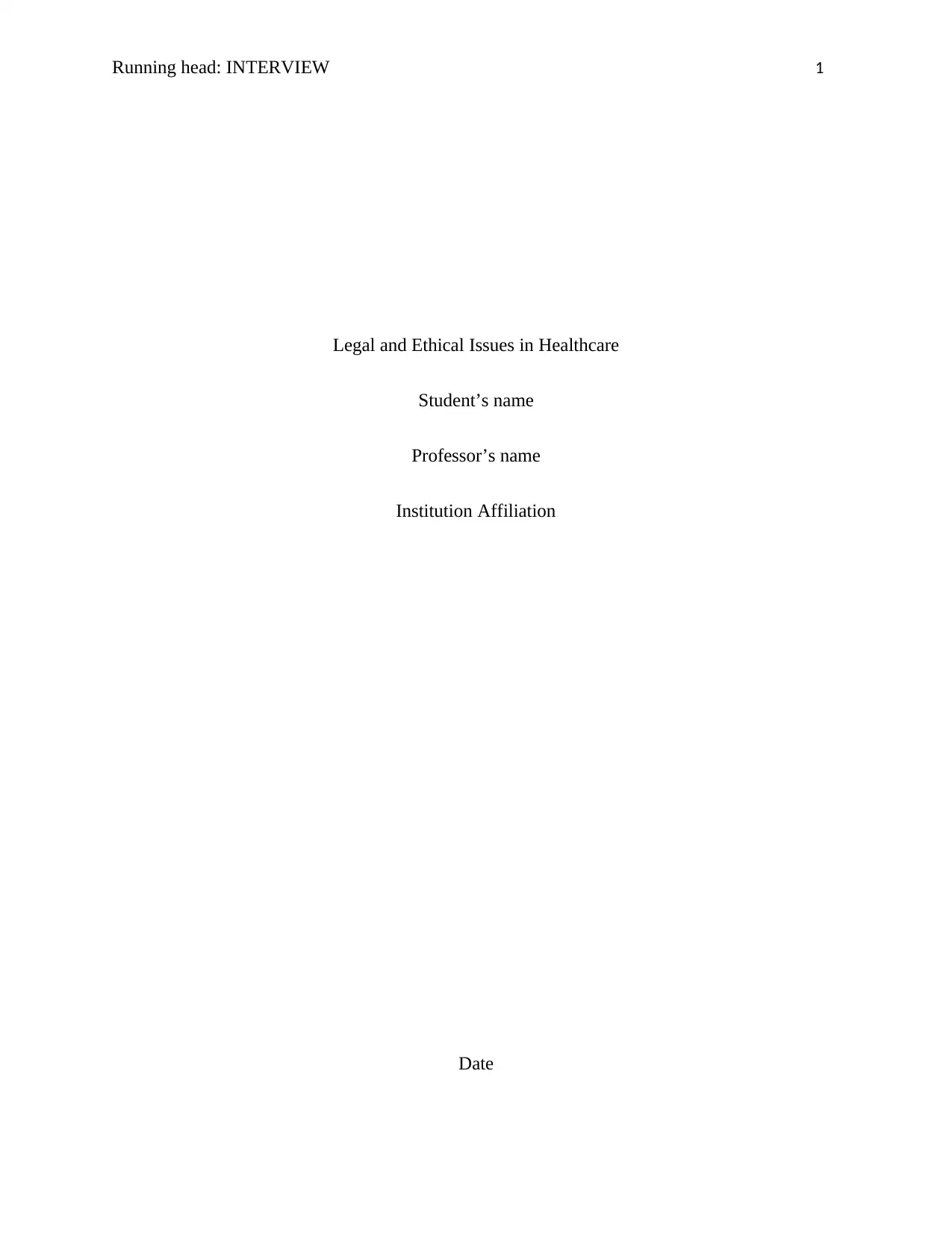
Running head: INTERVIEW 1
Legal and Ethical Issues in Healthcare
Student’s name
Professor’s name
Institution Affiliation
Date
Legal and Ethical Issues in Healthcare
Student’s name
Professor’s name
Institution Affiliation
Date
Paraphrase This Document
Need a fresh take? Get an instant paraphrase of this document with our AI Paraphraser
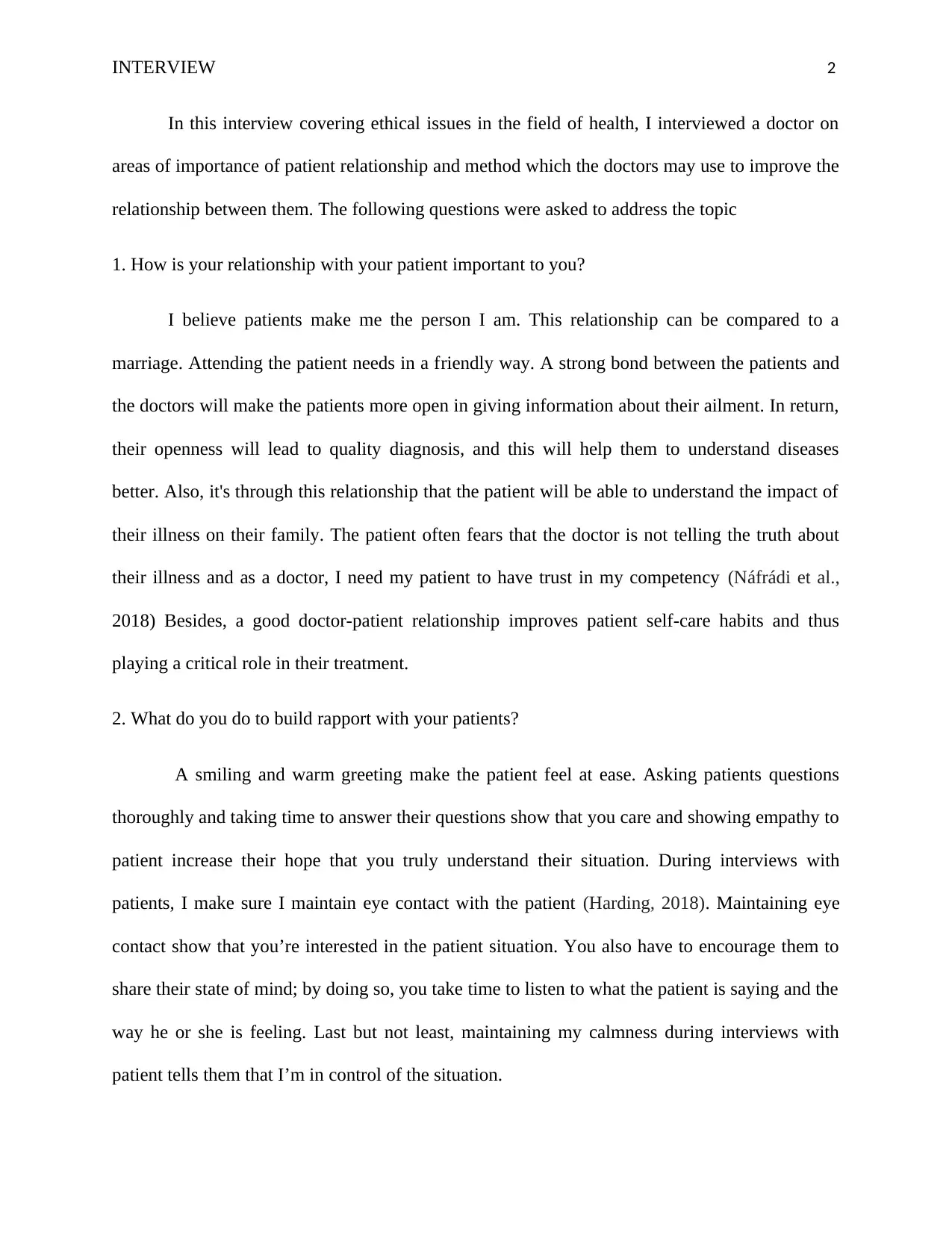
INTERVIEW 2
In this interview covering ethical issues in the field of health, I interviewed a doctor on
areas of importance of patient relationship and method which the doctors may use to improve the
relationship between them. The following questions were asked to address the topic
1. How is your relationship with your patient important to you?
I believe patients make me the person I am. This relationship can be compared to a
marriage. Attending the patient needs in a friendly way. A strong bond between the patients and
the doctors will make the patients more open in giving information about their ailment. In return,
their openness will lead to quality diagnosis, and this will help them to understand diseases
better. Also, it's through this relationship that the patient will be able to understand the impact of
their illness on their family. The patient often fears that the doctor is not telling the truth about
their illness and as a doctor, I need my patient to have trust in my competency (Náfrádi et al.,
2018) Besides, a good doctor-patient relationship improves patient self-care habits and thus
playing a critical role in their treatment.
2. What do you do to build rapport with your patients?
A smiling and warm greeting make the patient feel at ease. Asking patients questions
thoroughly and taking time to answer their questions show that you care and showing empathy to
patient increase their hope that you truly understand their situation. During interviews with
patients, I make sure I maintain eye contact with the patient (Harding, 2018). Maintaining eye
contact show that you’re interested in the patient situation. You also have to encourage them to
share their state of mind; by doing so, you take time to listen to what the patient is saying and the
way he or she is feeling. Last but not least, maintaining my calmness during interviews with
patient tells them that I’m in control of the situation.
In this interview covering ethical issues in the field of health, I interviewed a doctor on
areas of importance of patient relationship and method which the doctors may use to improve the
relationship between them. The following questions were asked to address the topic
1. How is your relationship with your patient important to you?
I believe patients make me the person I am. This relationship can be compared to a
marriage. Attending the patient needs in a friendly way. A strong bond between the patients and
the doctors will make the patients more open in giving information about their ailment. In return,
their openness will lead to quality diagnosis, and this will help them to understand diseases
better. Also, it's through this relationship that the patient will be able to understand the impact of
their illness on their family. The patient often fears that the doctor is not telling the truth about
their illness and as a doctor, I need my patient to have trust in my competency (Náfrádi et al.,
2018) Besides, a good doctor-patient relationship improves patient self-care habits and thus
playing a critical role in their treatment.
2. What do you do to build rapport with your patients?
A smiling and warm greeting make the patient feel at ease. Asking patients questions
thoroughly and taking time to answer their questions show that you care and showing empathy to
patient increase their hope that you truly understand their situation. During interviews with
patients, I make sure I maintain eye contact with the patient (Harding, 2018). Maintaining eye
contact show that you’re interested in the patient situation. You also have to encourage them to
share their state of mind; by doing so, you take time to listen to what the patient is saying and the
way he or she is feeling. Last but not least, maintaining my calmness during interviews with
patient tells them that I’m in control of the situation.
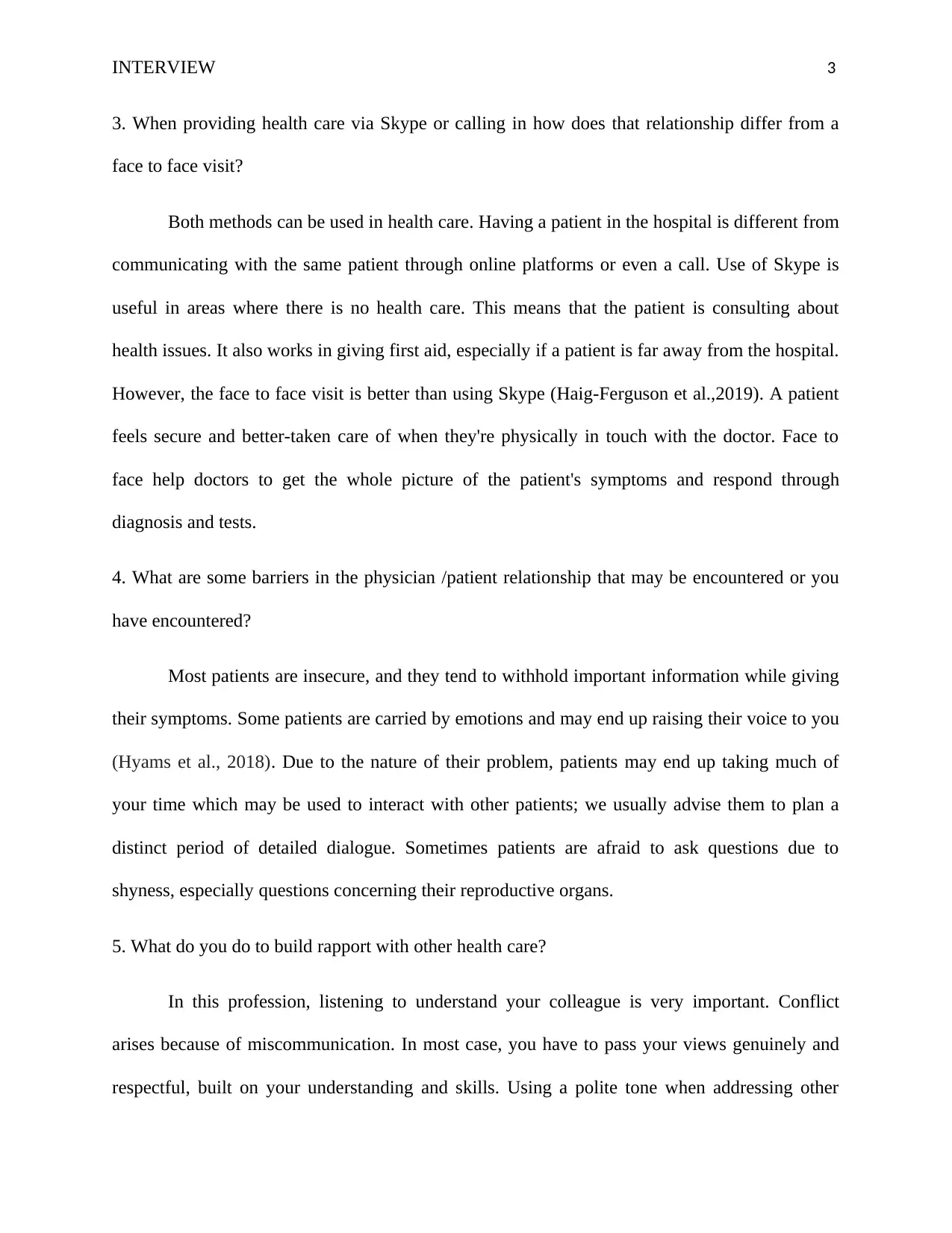
INTERVIEW 3
3. When providing health care via Skype or calling in how does that relationship differ from a
face to face visit?
Both methods can be used in health care. Having a patient in the hospital is different from
communicating with the same patient through online platforms or even a call. Use of Skype is
useful in areas where there is no health care. This means that the patient is consulting about
health issues. It also works in giving first aid, especially if a patient is far away from the hospital.
However, the face to face visit is better than using Skype (Haig-Ferguson et al.,2019). A patient
feels secure and better-taken care of when they're physically in touch with the doctor. Face to
face help doctors to get the whole picture of the patient's symptoms and respond through
diagnosis and tests.
4. What are some barriers in the physician /patient relationship that may be encountered or you
have encountered?
Most patients are insecure, and they tend to withhold important information while giving
their symptoms. Some patients are carried by emotions and may end up raising their voice to you
(Hyams et al., 2018). Due to the nature of their problem, patients may end up taking much of
your time which may be used to interact with other patients; we usually advise them to plan a
distinct period of detailed dialogue. Sometimes patients are afraid to ask questions due to
shyness, especially questions concerning their reproductive organs.
5. What do you do to build rapport with other health care?
In this profession, listening to understand your colleague is very important. Conflict
arises because of miscommunication. In most case, you have to pass your views genuinely and
respectful, built on your understanding and skills. Using a polite tone when addressing other
3. When providing health care via Skype or calling in how does that relationship differ from a
face to face visit?
Both methods can be used in health care. Having a patient in the hospital is different from
communicating with the same patient through online platforms or even a call. Use of Skype is
useful in areas where there is no health care. This means that the patient is consulting about
health issues. It also works in giving first aid, especially if a patient is far away from the hospital.
However, the face to face visit is better than using Skype (Haig-Ferguson et al.,2019). A patient
feels secure and better-taken care of when they're physically in touch with the doctor. Face to
face help doctors to get the whole picture of the patient's symptoms and respond through
diagnosis and tests.
4. What are some barriers in the physician /patient relationship that may be encountered or you
have encountered?
Most patients are insecure, and they tend to withhold important information while giving
their symptoms. Some patients are carried by emotions and may end up raising their voice to you
(Hyams et al., 2018). Due to the nature of their problem, patients may end up taking much of
your time which may be used to interact with other patients; we usually advise them to plan a
distinct period of detailed dialogue. Sometimes patients are afraid to ask questions due to
shyness, especially questions concerning their reproductive organs.
5. What do you do to build rapport with other health care?
In this profession, listening to understand your colleague is very important. Conflict
arises because of miscommunication. In most case, you have to pass your views genuinely and
respectful, built on your understanding and skills. Using a polite tone when addressing other
⊘ This is a preview!⊘
Do you want full access?
Subscribe today to unlock all pages.

Trusted by 1+ million students worldwide
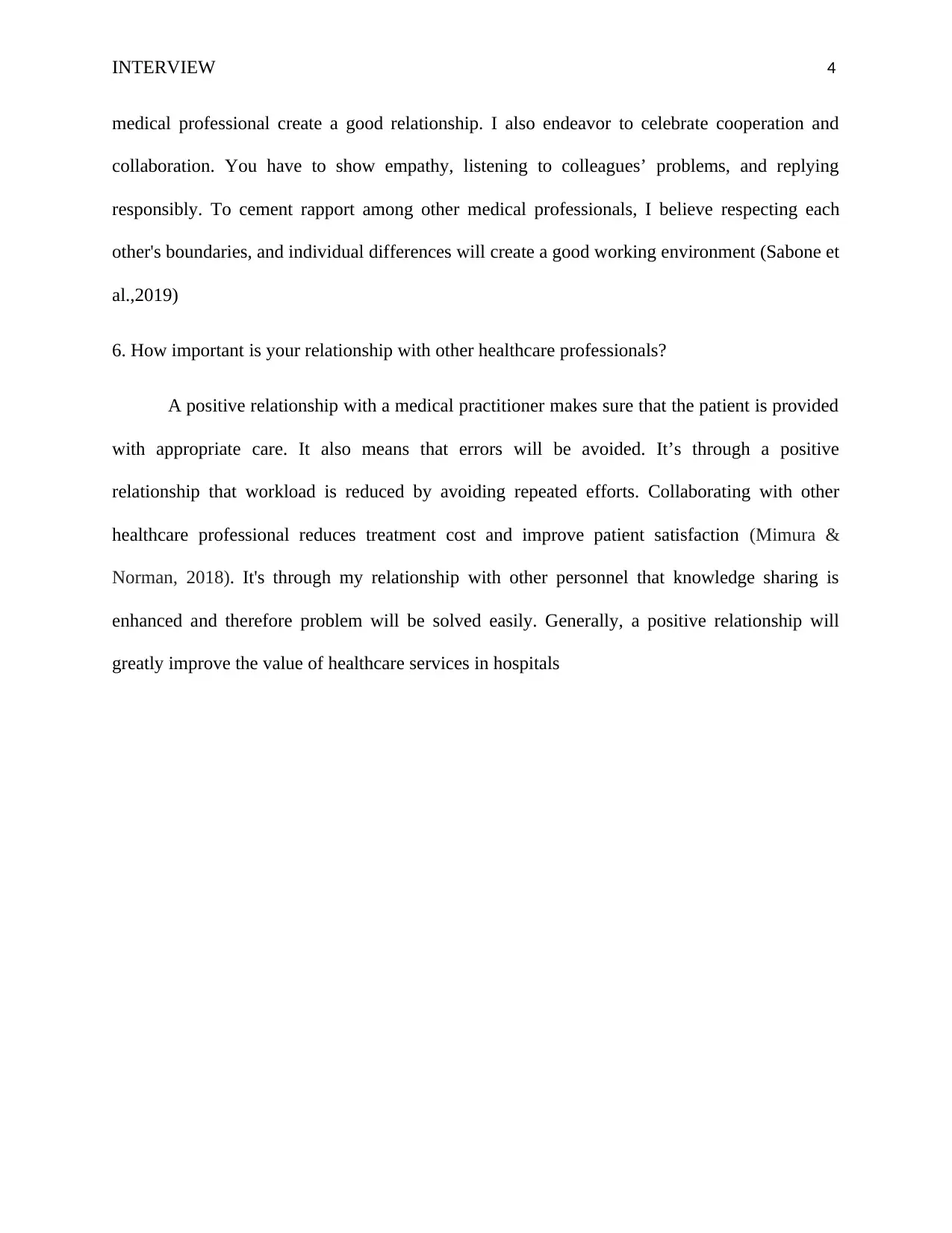
INTERVIEW 4
medical professional create a good relationship. I also endeavor to celebrate cooperation and
collaboration. You have to show empathy, listening to colleagues’ problems, and replying
responsibly. To cement rapport among other medical professionals, I believe respecting each
other's boundaries, and individual differences will create a good working environment (Sabone et
al.,2019)
6. How important is your relationship with other healthcare professionals?
A positive relationship with a medical practitioner makes sure that the patient is provided
with appropriate care. It also means that errors will be avoided. It’s through a positive
relationship that workload is reduced by avoiding repeated efforts. Collaborating with other
healthcare professional reduces treatment cost and improve patient satisfaction (Mimura &
Norman, 2018). It's through my relationship with other personnel that knowledge sharing is
enhanced and therefore problem will be solved easily. Generally, a positive relationship will
greatly improve the value of healthcare services in hospitals
medical professional create a good relationship. I also endeavor to celebrate cooperation and
collaboration. You have to show empathy, listening to colleagues’ problems, and replying
responsibly. To cement rapport among other medical professionals, I believe respecting each
other's boundaries, and individual differences will create a good working environment (Sabone et
al.,2019)
6. How important is your relationship with other healthcare professionals?
A positive relationship with a medical practitioner makes sure that the patient is provided
with appropriate care. It also means that errors will be avoided. It’s through a positive
relationship that workload is reduced by avoiding repeated efforts. Collaborating with other
healthcare professional reduces treatment cost and improve patient satisfaction (Mimura &
Norman, 2018). It's through my relationship with other personnel that knowledge sharing is
enhanced and therefore problem will be solved easily. Generally, a positive relationship will
greatly improve the value of healthcare services in hospitals
Paraphrase This Document
Need a fresh take? Get an instant paraphrase of this document with our AI Paraphraser
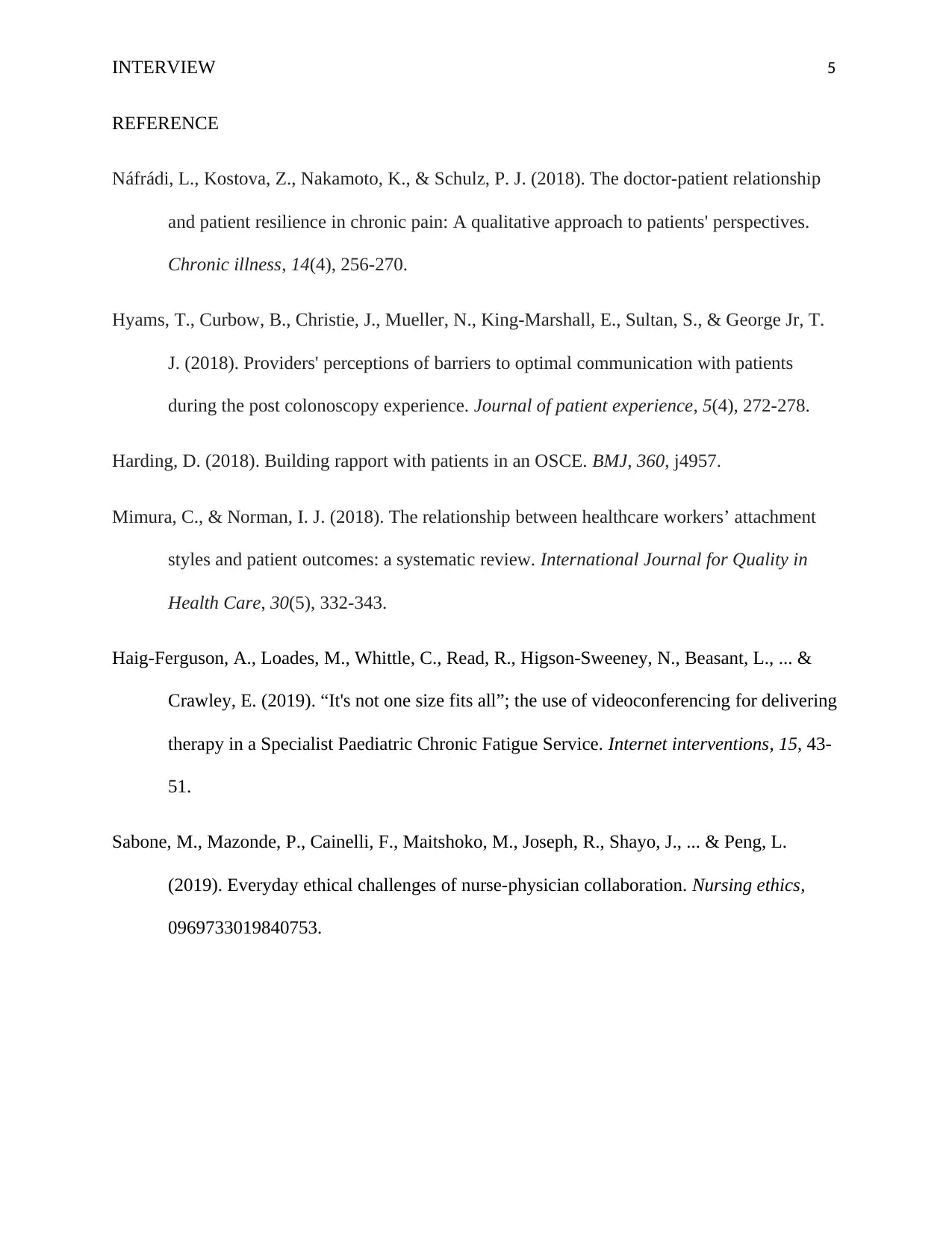
INTERVIEW 5
REFERENCE
Náfrádi, L., Kostova, Z., Nakamoto, K., & Schulz, P. J. (2018). The doctor-patient relationship
and patient resilience in chronic pain: A qualitative approach to patients' perspectives.
Chronic illness, 14(4), 256-270.
Hyams, T., Curbow, B., Christie, J., Mueller, N., King-Marshall, E., Sultan, S., & George Jr, T.
J. (2018). Providers' perceptions of barriers to optimal communication with patients
during the post colonoscopy experience. Journal of patient experience, 5(4), 272-278.
Harding, D. (2018). Building rapport with patients in an OSCE. BMJ, 360, j4957.
Mimura, C., & Norman, I. J. (2018). The relationship between healthcare workers’ attachment
styles and patient outcomes: a systematic review. International Journal for Quality in
Health Care, 30(5), 332-343.
Haig-Ferguson, A., Loades, M., Whittle, C., Read, R., Higson-Sweeney, N., Beasant, L., ... &
Crawley, E. (2019). “It's not one size fits all”; the use of videoconferencing for delivering
therapy in a Specialist Paediatric Chronic Fatigue Service. Internet interventions, 15, 43-
51.
Sabone, M., Mazonde, P., Cainelli, F., Maitshoko, M., Joseph, R., Shayo, J., ... & Peng, L.
(2019). Everyday ethical challenges of nurse-physician collaboration. Nursing ethics,
0969733019840753.
REFERENCE
Náfrádi, L., Kostova, Z., Nakamoto, K., & Schulz, P. J. (2018). The doctor-patient relationship
and patient resilience in chronic pain: A qualitative approach to patients' perspectives.
Chronic illness, 14(4), 256-270.
Hyams, T., Curbow, B., Christie, J., Mueller, N., King-Marshall, E., Sultan, S., & George Jr, T.
J. (2018). Providers' perceptions of barriers to optimal communication with patients
during the post colonoscopy experience. Journal of patient experience, 5(4), 272-278.
Harding, D. (2018). Building rapport with patients in an OSCE. BMJ, 360, j4957.
Mimura, C., & Norman, I. J. (2018). The relationship between healthcare workers’ attachment
styles and patient outcomes: a systematic review. International Journal for Quality in
Health Care, 30(5), 332-343.
Haig-Ferguson, A., Loades, M., Whittle, C., Read, R., Higson-Sweeney, N., Beasant, L., ... &
Crawley, E. (2019). “It's not one size fits all”; the use of videoconferencing for delivering
therapy in a Specialist Paediatric Chronic Fatigue Service. Internet interventions, 15, 43-
51.
Sabone, M., Mazonde, P., Cainelli, F., Maitshoko, M., Joseph, R., Shayo, J., ... & Peng, L.
(2019). Everyday ethical challenges of nurse-physician collaboration. Nursing ethics,
0969733019840753.
1 out of 5
Related Documents
Your All-in-One AI-Powered Toolkit for Academic Success.
+13062052269
info@desklib.com
Available 24*7 on WhatsApp / Email
![[object Object]](/_next/static/media/star-bottom.7253800d.svg)
Unlock your academic potential
Copyright © 2020–2025 A2Z Services. All Rights Reserved. Developed and managed by ZUCOL.





